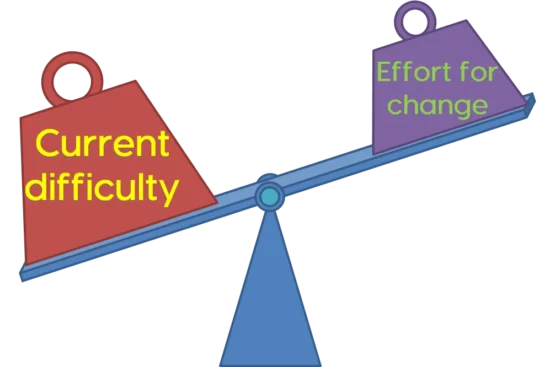Change is crucial in our lives, necessary for our development as individuals and as a society. We need to be increasingly flexible in our environment, change is inevitable to adapt to a new situation that arises or improve something.
Remember that the kind of change we are talking about is something major, it can be big or small but with a real impact on your life.
A large part of people tends to resist change. Some people complain about the situation but do nothing, others remain in the situation, are passive and think that the problem will be solved sooner or later.
There are actually 3 main options where we are active and taking control of the situation :
- Acceptation: accept the situation totally or partially for a while
- Modification: improve the situation by changing something
- Giving up: get away from the situation when acceptance is not an option and all the changes you’ve tried haven’t worked
The main reasons of the resistance for a change such as an improvement are as follow:
1. Fear of the unknown
The brain is programmed for stability and predictability to reduce the energy consumed and improve efficiency.
Anxiety and doubts can be felt when trying new things.
2. Fear of loss
We are attached to a certain security in our lives. We would rather stick with what we know than risk losing out by adoptiong something new.
A real popular resistance is observed in saying that at least you know what you have, what you’ll lose, but never what you’ll get instead. This can be true, but also very false when a change or choice is based on fundamental values and made with full knowledge of the facts. And, yes, sometimes it’s a bit of a risk to take, but if it doesn’t work out, at least we’ve learned something and tried.
3. Disruption of identity and beliefs
In a change there are modification in different levels such as the behaviors, beliefs and the identity. We can feel anxious or lost when the foundations of our existence and belief system are re-evaluated.
We could ask ourself : who am I now?
Example : I’m coached to get rid of my shyness. I could change my identity from “I’m a slightly shy person” to “I’m an opened and a sociable person”, the identity changes completely as well as beliefs and behaviors
4. Resistance of habits
There is some inertia for the habits. It can take some time and repetition before integrating a change. During this in-between time, more energy is needed to create new things and can be a barrier.
Also the bad and old habits are coming back very easily and quickly.
5. Missing a vision of after change
Changing is to get rid of bad things and/or gaining better ones.
When the vision of the post-transformation state is unclear, and the benefits to be gained are not well defined. There might be a lack of motivation to introduce change.
6. Past traumas and negative experiences
Past negative experiences or traumas related to change can create a psychological barrier to embracing new transformations.
Here under I propose some solutions or part of solutions to embrace change much more easier.
Note that a coach is highly recommended as he is an ambassador of the change and can support you in this journey. Some of a change can be life changing and have some huge impacts on your life, make sure your are well advice before taking this kind of big steps.
1. Overcome Fear
Behind every fear is a desire. The greater the fear, the greater the desire.
This kind of fear felt in a change is the completely natural and should be acknowledge as an harmless and natural fear of change.
Focus on the desire and not on the fear.
Reach out a coach to deal with fear.
2. Equation of change
The difficulty of obtaining the good resulting from the change must be less than the current difficulty.
Humans tend to stay in their difficulties, especially if the way out seems more difficult than the current situation.
To have a change occurring:
- Reconsider the scale of the current situation (increase weight of the problem)
- Increase the benefits of the change (reduce weight of the efforts)
- Reduce the disadvantages of the change (reduce weight of the efforts)

3. Flexible identity
Identity here refers to how you define yourself as a person.
Identity can and should change, especially if it’s holding you back.
In the midst of great change, you have to stay true to your core values to avoid to get lost.
Consider support for this kind of big changes in your life.
4. Habits introduction
Stick to the change and remain regular repeating the new behavior required for the change as often as necessary.
A coach may be needed for this operation to maintain motivation, consistency over time and build strong customized strategies.
5. Vision
A coach or someone who has already achieved what you want to achieve can give you a motivating vision.
Vision will increase the benefits of change which will move you into action. The vision of your future after change must be very attractive.
6. Overcome past traumas and negative experiences
Get some help from a therapist or a coach if some past experiences are holding you back to implement any change.
7. Create a culture of change
Get used to changing little things in your life: try new food, try new activities, travel more, keep an open minded and curious about new things.
Implement very small changes in your life to get in touch with the change process and deal with the small fears and resistance associated.
You can progressively increase the range of change you are doing in your life.
Think about 3 main things you wish to modify in your life, select the most important one and start taking care of it, you can always contact me to get you started.


